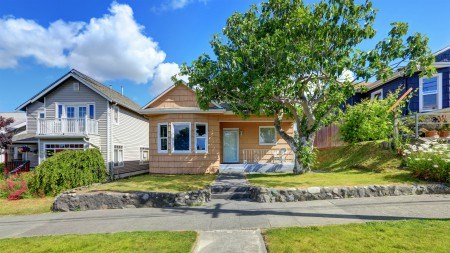For most of us, our homes are our sanctuary – the place where we find peace and a chance to get away from the craziness of the world around us. But living in a home that offers us that peaceful, tranquil vibe can be tricky, especially if you don’t know what to look out for at the outset.
See more: Add some zen to your space
So what should you be aware of if tranquillity is high on your priority list when house hunting? Here are our top tips to help you find that peaceful abode.
Consider the location
The location of a potential home plays a huge role in how quiet or noisy it could prove to be. Homes that are close to schools, bars, restaurants or nightclubs are never a good choice if you’re wanting to create a quiet haven for yourself, especially when the sun sets. It’s also worthwhile paying attention to the actual position of your home on the street with regards to speed bumps, intersections, hills and volume of traffic. For example, living on a hill where cars either have to accelerate or slam on brakes will definitely affect the amount of noise you will be exposed to. Furthermore, pay attention to neighbouring properties for evidence of children i.e. bikes on the front lawn or jungle gyms, as this can also serve as an indicator that noise is probably a guarantee.
Go at different times before choosing
When choosing a home to live in, it is advisable to visit it on more than one occasion, preferably at different times during the day or night if you are able. Some homes can be very noisy during the day, but quiet at night or vice versa, so be sure to invest that little bit of extra time by doing your homework to ensure you aren’t taken by surprise when moving in. It’s also worthwhile stopping in on a Saturday or Sunday because chances are, most of your neighbours will be home at this time and this could serve as a very good gauge of what’s to be expected noise-wise.
Head for the top
If you are looking at moving into an apartment or flat, the top floor is usually a safe bet when it comes to noise-levels given that you won't have a neighbour above you. Top floor apartments also tend to be further away from noise at street level, like hooting or general traffic sounds. They are also often “off the beaten path” and less exposed to tenant or visitor foot traffic, which also plays a role in how peaceful your home can be.
Read more: 8 things to check before renting an apartment
Ask the neighbours
If at all possible, it is a good idea to take the extra time and make the effort to chat to your potential neighbours as they will often be the best source of information when it comes to noise-levels, complaints or issues. Try and establish who has been in the neighbourhood or apartment block the longest and ask them for their experience of how peaceful the neighbourhood is or could be.
Take note of the finishes
When looking for a home, it is advisable to consider what acoustics the home naturally offers. For example, homes with wooden or tiled floors are often a lot noisier than those with carpeted floors. Furthermore, homes that have thinner walls, especially in apartment blocks, will definitely aid in the way that sound travels so if possible, opt for a home with thicker walls or those that don’t have many shared walls with neighbours. If you find yourself living in a naturally noisy home, fear not! Things like opting for thicker curtains instead of blinds or adding throws or rugs to your living spaces can all assist in reducing the amount of noise produced. You can even take things one step further if need be and soundproofing underneath your wooden floors or double-glazing your windows if the noise-levels are becoming too much for you to handle.
See more: 6 décor tips for a stress free home
At the end of the day, noise is a part of our everyday life but that doesn’t mean that we can’t escape it when coming home. Taking the time to really consider a potential home and the noise potential around it will go a long way to ensuring not only your peace of mind, but the peace and quiet as well!




